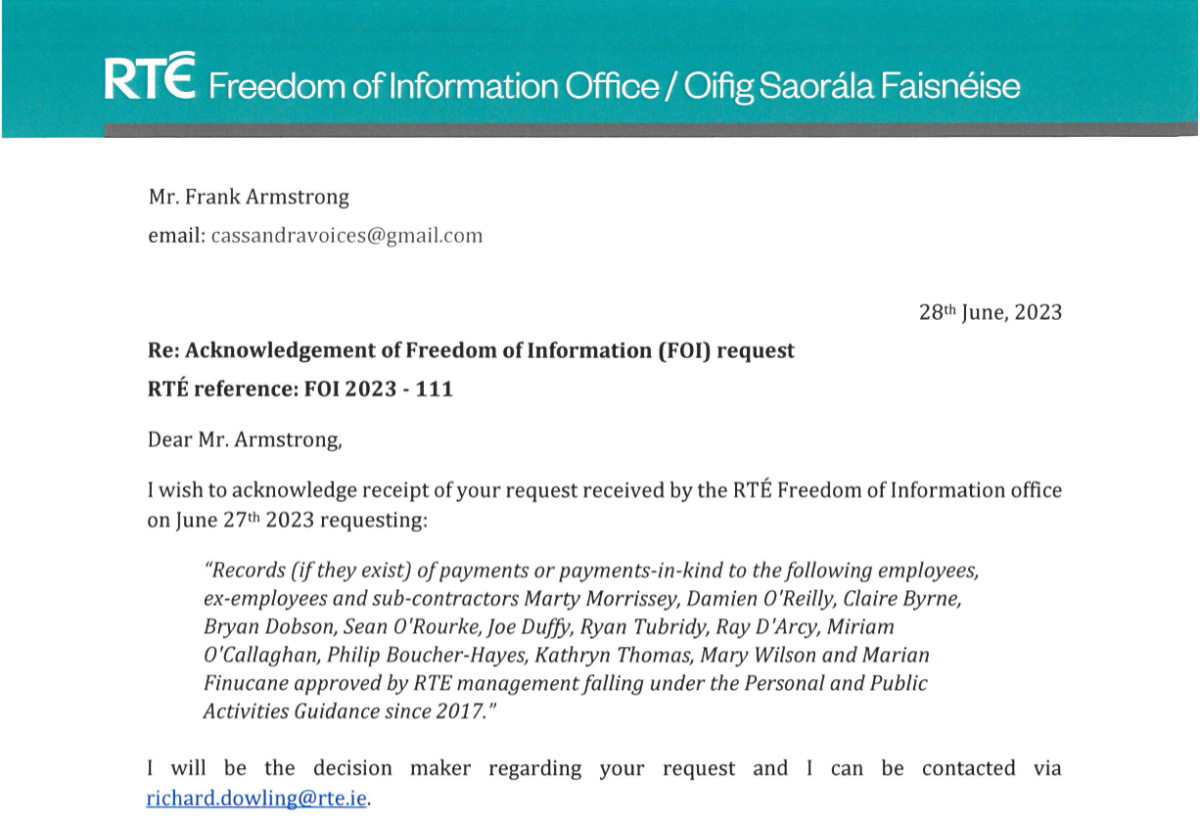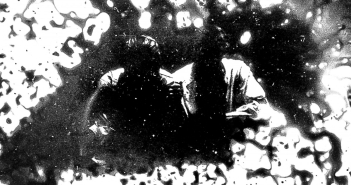The significance of Joe Duffy (Liveline, June 26, 2023) insisting that Ryan Tubridy (from 12.30) “really is a unique talent” should not be overlooked.
It isn’t simply that Joe and Ryan (along with a host of RTÉ’s household names) share Noel Kelly as an agent. It also reveals Joe’s interest in maintaining a near-feudal pay structure, rewarding “unique talent”.
This seems to reflect Joe’s assessment of his own qualities, justifying a salary of €350,000 per year. Does it really take a “unique talent” to field complaints from parents about having to pay €60 for a child’s confirmation?
Notably, Joe is fixated on maintaining high ratings for his show. As he put it in 2017: ‘One of the reasons I say that we have to have our numbers up [is]because it only works when the numbers are up.’
The Joe Duffy Show is a careful balancing act between heart-rending accounts appealing to an older, pearl-clutching, audience – often sparking moral panic – and outright absurdity or light entertainment (including ‘Funny Fridays’). That is not to say that the show never addresses important issues or even breaks stories, but the formula is clearly calibrated by experienced – and even talented – producers. That’s why other presenters seamlessly ‘take the chair.’
Undoubtedly, the issues they choose to lead on arise from careful consideration. Joe doesn’t simply allow members of the public to have their say. This certainly seemed evident during the June 26 programme, as a succession of callers ‘spoke out’ in favour of Ryan Tubridy. At a point when most of the country was up in arms, wagons were circling.
Joe’s particular skill lies in not offending anyone that matters; this extends to the car company sponsoring his show, but crucially finds him reinforcing key government messages.
For example, during Covid, rather than allowing for a reasoned debate among experts on the thorny question of vaccination policy, Joe chose to platform an individual claiming the vaccine was a ‘mark of the beast.’ Naturally, reasonable Joe rode to the rescue to restore our collective sanity.
Latterly, he has weighed in with belligerent statements on Russia-Ukraine that align with the government’s response. Thus in May, 2023 he opined: ‘War only ends primarily when one side is beaten by the other side.’ As Mick Heaney put it in the Irish Times: ‘He’s so impassioned that callers with mildly divergent views struggle to get a word in edgeways at times. Talk to Joe? Not when he’s in this form.’
Tubridy’s Unique Ability?
During his 9am radio slot and as presenter of the Late Late Show Ryan was rarely overtly political, although he was happy to endorse a complimentary biography of Leo Varadkar, and chose to interview Micheál Martin on his penultimate outing as Late Late Show host.
Tubridy plays a different role to Joe Duffy, which I have previously argued is essential to a distinctively Irish propaganda. This is to maintain the feel-good factor. Light entertainment on the airwaves provides a comfort blanket for all sorts of troubles, from Covid to the cost of living. Indeed, Tubridy’s relentless chirpiness recalls the Depression-era song, popularised by Bing Crosby: ‘Wrap Your Troubles in Dreams (and Dream your Troubles Away)’
Almost uniquely on RTÉ Radio 1 – the Ray D’Arcy show has a similarly vacuous quality – Tubridy’s programmes became an extended commercial: a kind of dream factory or Late Late Toy Show for adults. Rather than engaging in tiresome arguments over our response to climate change, listeners and viewers are subliminally guided into treating themselves to the latest car model. Smile, it’s easy.
In this argument-free zone, the mask occasionally slipped, as where Tubridy suggested on the Late Late Show in 2018 that cyclists who (legally) cycle two abreast should be ‘binned’.
RTÉ’s Peasant Revolt
A significant proportion of the Irish public ignore RTÉ, and aren’t in the least bit surprised by the revelations. The real outrage emanated from RTÉ staff who did not take kindly to their highest earner being over-paid in an underhand fashion. This arrived at a time when, presumably, many are feeling the pinch during an extended Cost of Living and Housing Crisis.
RTÉ staff are a formidable and influential body that seem to have gained control of the news rooms, even if the likes of the Joe Duffy Show may be acting in the interest of Tubridy. The sans culottes seemed determined to eviscerate the ancien regime. Whether the defenestrations of Dee Forbes and Ryan Tubridy will be sufficient remains to be seen.
The looming question is whether these RTÉ journalists, who appear to be led by Education Correspondent Emma O’Kelly are committed to a long overdue overhaul of public service broadcasting. This ought to entail an end to programming that serves as a vehicle for so-called ‘talent’. Notably, BBC Radio 4’s schedule does not contain a single programme that takes its name from a presenter.
But RTÉ staff may have to be prepared to cut their cloth further. It is unclear whether public service broadcasting is compatible with selling advertising space.
A fully state-funded model would also bring its own problems – as we witnessed during the Covid-era when RTÉ often became a conduit for government propaganda – but safeguards, as in the BBC’s commitment to impartiality, could be put in place. A slimmed down model – with a primary focus on current affairs and high culture – would surely represent an improvement on the kind of schlock – epitomised by Ryan Tubridy – we have become accustomed to.

A Basic Requirement
In 2017 I lodged a Freedom of Information (FOI) request seeking details of payments by third parties to a number of RTÉ stars, including Ryan Tubridy, approved by RTÉ management falling under the Personal and Public Activities Guidance for 2017.
The officer refused to divulge precise details, claiming this could be advantageous to competitors, might result in financial loss to contractors, and potentially ‘prejudice RTÉ ’s contractual negotiations in respect of future engagements with independent contractors’.
He revealed, however, that ‘the total number of requests to engage in external ventures that RTÉ received was 122. Of that number, 114 were approved and 8 were refused. Of those granted, 97 were independent contractor requests and 1 was a RTÉ employee request. Of those refused, 7 were independent contractor requests and 17 were RTÉ employee requests.’
That the vast majority of requests were approved, particularly to independent contractors, demonstrated that the organisation was taking a permissive approach on conflicts of interest.
RTÉ claimed the majority of payments were for ‘non-commercial events, and mostly in support of charitable or other not-for-profit organisations’. In the absence of further details, however, it was impossible to verify this claim. If their work really was benign, why were they withholding the information?
The claim that divulging information would “prejudice RTÉ ’s contractual negotiations” suggests the likes of Ryan Tubridy would have been lost to commercial competitors if information entered the public domain. That contention may be questioned, in the case of Tubridy at least. After moonlighting with the BBC in 2016 Tubridy admitted he had found connecting with UK listeners difficult, while leaving for Newstalk or TV3 would have represented a career regression.
Most of RTÉ ’s household names found fame, and fortune, through extended exposure on RTÉ. The failure of Pat Kenny to draw a substantial number of his former listeners away from the station, when he departed for Newstalk, indicates most people are in the habit of tuning into the state broadcaster, rather than to listen to the unique talent.
Transparency?
This week I sent in another FOI seeking records (if they exist) of payments or payments-in-kind to the same ‘stars’, approved by RTE management falling under the Personal and Public Activities Guidance since 2017. It will be interesting to find out whether transparency is now given a higher priority than “contractual negotiations”.






